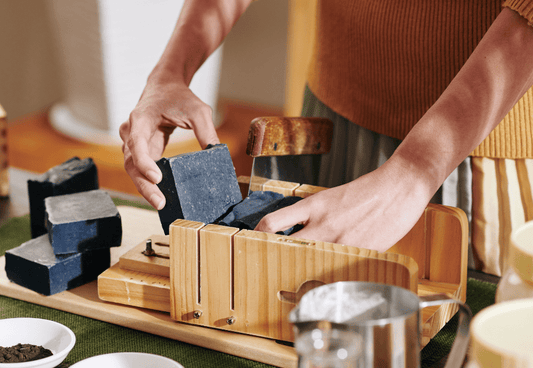In recent years, the popularity of natural oils in cosmetics has skyrocketed. But have you ever stopped to think about the purity of the oil you use?
Unfortunately, many oils on the market are fraudulent. They're cheap sunflower oil blends.
In this series of blog posts, we will show you the shocking reality.
To begin, we will be looking at sweet almond oil. We have become concerned with the purity of the sweet almond oil available in the market. We’ve run some tests, and you’ll be shocked at the results
Many people in the industry will hate us for revealing this to you, but we believe that you deserve to know the truth.
Contents
- What Are You Really Buying?
- Understanding Sweet Almond Oil
- How the Almond Oil Market Works
- How Almond Oil Producers Work
- How is Almond Oil Adulterated?
- What Are The Grades of Sweet Almond Oil?
- Identifying Pure Sweet Almond Oil
- Risks of Adulterated Sweet Almond Oil
- The Importance of Transparency and Research
- Conclusion
What Are You Really Buying?
We gathered 6 samples of sweet almond oil from different online retailers. All of them failed the purity tests.
That’s right, all of them.
Worse than that, there was no evidence that any of the samples contained any almond oil at all.
They all looked exactly like sunflower oil.
Shocked? Read on to find out how this happens, and why.

Understanding Sweet Almond Oil
Sweet almond oil is a natural oil that is extracted from the nut of the almond tree (Prunus amygdalus Dulcis). The extraction process involves pressing the almonds to release the oil, which is then filtered and refined to produce a pure and high-quality product.
Pure almond oil has amazing moisturising properties and is a great source of vitamin E. This helps improve the health and appearance of the skin.
Almond oil can be used for a wide range of applications, which is why it is perfect in both haircare and skincare formulations. This popular natural oil is used in cosmetic products like face masks, moisturisers, soap, hair treatments, creams, body oils, conditioners, lip balms and more.
The almond oil market is truly huge, it is estimated to be worth well over a billion dollars per year globally. That equates to hundreds of thousands of tonnes of almond oil sold every year.
There are a few main producers, some in Spain and some in the US.

How the Almond Oil Market Works
The market for sweet almond oil has become increasingly more popular over recent years. Most almond oil that is sold in the UK is from Spain.
While the growing market presents opportunities for manufacturers and suppliers, it also creates a risk of adulteration.
Natural oils are grown, not made. That means there’s a real limit on how much almond oil can be made: How many almonds were grown? If they’ve all been used, we can’t just create more.
This means rising demand = rising prices.
But no one wants to pay rising prices, so there’s pressure on suppliers to keep costs down. This has caused many manufacturers to start diluting the almond oil with cheaper oils.
Diluting or adulterating the oil to meet the growing market needs, can compromise its quality, efficacy, and safety.

How Almond Oil Producers Work
Imagine the scene, you go to meet different manufacturers around Spain. Each meeting starts with a carefully choreographed conversation, they ask you coy questions like: “What type of almond oil do you buy?” and “What kind of price do you normally pay?”.
To the uninitiated these sound like normal questions, but everyone in the industry knows that they’re asking you this question: “How much sunflower oil do you want in your almond oil?”
I’ve visited producers that will offer you 10 different “types” of almond oil, all with different prices. The 10 different types are: 10% almond oil, 20% almond oil, 30% almond oil etc.
The bad news is that they’re prepared to label all of them with just two words: Almond oil.
That means the oil is brought into the country and only the person who bought it knows how much almond oil is really in there. When it is sold on to a wholesaler, there’s no trace of this deception left.
All traceability is lost, and the retailer doesn’t know where the almond oil comes from, or what is in it. Scary, but true.
How is Almond Oil Adulterated?
This is where it gets technical, but stick with it.
Natural oils are mostly made up of Triglycerides, which are molecules containing fatty acids. There are many types of fatty acids, with names like Oleic Acid, Linoleic Acid etc.
Oils are usually described by their fatty acid profile, which tells you what percentage of which fatty acid is in the oil.
Here’s the range you would expect to see almond oil fatty acids in:

Understanding Sunflower Oil
Sunflower oil is perhaps the cheapest vegetable oil around, so it’s a natural go-to for adulterators.
There’s more than one type of sunflower oil: High Linoleic, Mid-Oleic, High Oleic, High Stearic/High Oleic.
The two that are relevant to us are: High Linoleic and High Oleic sunflower
The table below shows the fatty acid profile of a 60% High Oleic sunflower and 40% High Linoleic sunflower blend, compared to 100% pure almond oil.

As you can see, the fatty acid profile for this sunflower oil is very similar to the almond oil.
However, pay attention to the Behenic acid results. The sunflower oil does not match the range you would expect to see pure almond oil in.
Many suppliers will remove behenic acid from the fatty acid profile so you don't notice the anomaly in the results.
From the tests we did, the sunflower oil result looks like what everyone in the UK is selling.
That’s right, the bottle says almond oil, the certificate of analysis says almond oil, but in the bottle it’s just sunflower oil.
It is important to be aware that many of the almond oils for sale may not be pure. Using adulterated almond oil could have potential health risks like allergic reactions, skin sensitivity and irritation.

What Are The Grades of Sweet Almond Oil?
Let's break them down one by one:
Cosmetic Grade
It’s basically sunflower oil. At best, 90% sunflower and 10% almond oil. Apparently it’s OK to sell it as “almond oil” if you mention that it’s cosmetic grade.
BP Grade
British Pharmacopoeia sounds pretty respectable eh?
Bad news, it’s not.
The sunflower blend from earlier would meet the BP specification.
I’ve seen some BP almond oils with a maximum limit of 0.8% Behenic acid, which would easily allow for most sunflower oils to pass the test.
There are other tests that the oil has to pass to be BP grade, it has to pass tests for adulteration with: apricot kernel oil, peach kernel oil, arachis oil, cottonseed oil and sesame seed oil. Crucially, not sunflower oil.
Would you be happy to receive 100% sunflower if you ordered almond oil? Then don’t buy BP grade almond oil.
Ph. Eur Grade (we call it Pharma grade)
Now, this is the one you want!
To meet the European Pharmacopoeia specifications, it really has to be 100% pure almond oil.
Don’t accept any imitations!
Identifying Pure Sweet Almond Oil
Ready for some more bad news? Just because the documents might say Pharma grade, you can’t necessarily trust them.
I’ve had samples of Pharma grade almond oil sent to me with a wonderfully professional looking Certificate of Analysis (COA). This COA details exactly match what a Pharma grade almond oil should be, but the oil itself is absolute rubbish.
How do I know? Independent, third-party lab testing.
It’s the only way to know for sure if your supplier is being honest with you. So why doesn’t everyone do it?
It’s expensive, time consuming and you have to be an expert to understand what exactly you’re testing for.
But there’s no shortcuts, it’s the only way with almond oil.
Here’s a checklist:
- Is the almond oil BP or Cosmetic Grade? If yes, it is at least 90% sunflower oil. Only buy Ph. Eur grade.
- Has your supplier done their own analysis of the oil? If they are relying on supplier documentation it means they have no idea what is in the oil.
- Do they actually know who made the almond oil? If there’s no traceability, there’s no honesty.
- Is Behenic acid (C22:0) listed on the COA? If it’s missing, you can be sure it is not pure almond oil.
- Is the Behenic acid level under 0.2%? There’s no excuse for it to be any higher, apart from adulteration with sunflower oil.
Producing a COA with almond oil written on the top, and saying: “We know the people who make the almond oil and they wouldn’t lie about it”, isn’t good enough.
I’ve had more people lie to my face about almond oil than I can remember.

Risks of Adulterated Sweet Almond Oil
Being aware that many almond oils have been adulterated is so important as using these diluted oils could have potential health risks.
Diluted almond oil may contain oils that can trigger allergic reactions in individuals who are sensitive or allergic to those ingredients.
Adulterated almond oil could also cause skin irritations and inflammation for sensitive skin.
Not only could adulterated oils harm the skin, but it also lacks the full range of benefits that pure almond oil provides.
The Importance of Transparency and Research
It's important to be proactive when it comes to ensuring the almond oil we use is safe and of high quality.
To make informed choices, it's vital to seek transparency from retailers and brands. One way to do this is by reaching out to brands directly. Inquire about their sourcing practices, extraction methods, and quality control measures.
Make sure to research reputable brands that can ensure they use trusted suppliers and take necessary measures to guarantee the almond oil is pure.

Conclusion
Pure almond oil is highly moisturising and very versatile, which is why it is so popular in the cosmetics industry. However, this market is flooded with dishonest suppliers.
If your almond oil is not pure, you won't see any of its amazing benefits. Don’t be afraid to contact companies directly to ensure the authenticity and purity of the oil they use.
Our promise: We will only sell 100% pure almond oil. We know exactly who has made it, Andy has visited them and seen the production taking place. We test at a third-party lab to be sure it is pure.
While the market may be filled with adulterated sweet almond oil, it's crucial not to let the bitter truth overshadow the natural benefits of this oil. By being informed and making conscious choices, you can enjoy the true potential of pure sweet almond oil in your daily life!
Continue reading
Now that you've learned about the purity of almond oil, why not continue reading?
- Interested in skincare recipes? Try our hyaluronic acid serum recipe
- Learn about lemon essential oil benefits with this blog: Lemon oil for skin
-
Want to make your own homemade soap? Try our mango butter soap recipe!
Let us know your thoughts on the purity of sweet almond oil in the comments!



